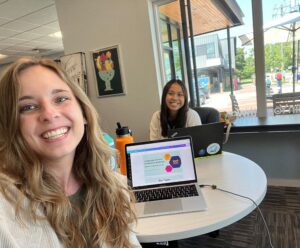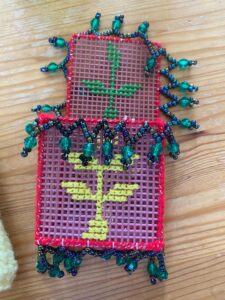Hello again! My name is Emily Benson, and I am a second-year MPH student in the global health concentration. I did my practicum this summer with Refugee Community Partnership (RCP), a non-profit organization in Carrboro, NC. RCP works alongside local refugee and immigrant communities to connect them to the resources and social connections they need to thrive and to mobilize organizations to eliminate barriers to accessing these resources.
I recently completed my practicum with RCP, and I have learned so much! I have been working with them on a research project that aims to identify the main barriers to health care among local refugee and immigrant communities. This practicum experience has not only deepened my passion for healthcare access and the social determinants of health but has also revealed a health barrier to me that is not often discussed in public health – language barriers.

The Importance (and Beauty!) of Language
The research project I was working on is a community-led research project that is analyzing language access in medical settings. This research consists of data from RCP’s Language Navigator Program (discussed in my previous blog post!) and community health forums. The research team is currently working to host community forums with six language communities: Arabic, Karen, Burmese, Pashto, Dari, and Spanish.
For my practicum, I have been working on two main tasks: (1) Analyzing the qualitative data from the language navigator program feedback surveys and (2) Working to organize the research data to effectively present the research findings to local healthcare institutions and professionals.
Through these tasks and working with individuals of various language communities, I have learned so much. I have particularly discovered a lot about my personal implicit biases around languages other than English. Working with RCP has opened my mind to the beauty and importance of different languages that are spoken here in the US and around the world. Enabling individuals to communicate in their own language is vitally important, as it has an enormous impact on many aspects of life – most prominently, an individual’s overall health. Specifically, lack of language access in medical settings has potentially detrimental effects including, but not limited to, critical information missed in a health appointment, miscommunication between the patient and provider, misdiagnosis of the patient, and/or incorrect or ineffective treatment.
Because of this internship, I can gratefully say that I will never take for granted language access again and have a new-found appreciation for all languages worldwide. I hope this research project will bring to light the health inequities that exist among refugee and immigrant communities in the US and pave a path to changes in medical institutions to reduce the impact of language barriers.
The Afghan Women’s Sewing Group
Over the course of my internship with RCP, I also had the opportunity to become involved with an Afghan Women’s Sewing Group. Being able to help with this pilot program has been very eye-opening for me. I have been able to meet, interact with, and get to know some amazingly brave and courageous women from Afghanistan and hear some of their stories.
It has been really cool to see them create community and share culture, experiences, and knowledge with each other through this group. Many of these women are incredibly talented when it comes to sewing and embroidery. Through this group, they have all made incredibly beautiful pieces!!

One of the biggest challenges that this experience presented to me was that I could not fully communicate directly with many of these women as we do not speak the same language. However, the most prominent thing I learned from this challenge is this:
A smile and acts of kindness are the same in every language.
I fully believe that these two things have the potential to be the bridge between all cultures and people around the world and can be the beginning of dismantling these language barriers. I have absolutely loved being able to connect with these women and experience a little bit of their beautiful culture and am grateful for all of the things I have learned along the way. I am very excited to see where this group goes in the future!
I want to end this blog with a quote that has changed my whole perspective on the importance and beauty of languages, and I hope it inspires each of you reading this blog as well.
“We dream in language, we sing in language, we think in language. It is tied to our lands, to our bodies, to our relationships, and to our knowledge. It is important that we feel respected as speakers—not just for what we have to say, but also how we say it.” – Antena Aire
Thanks for reading and following along as I completed my practicum!
– Emily
